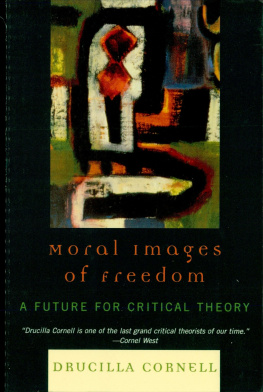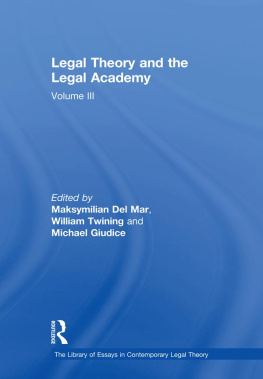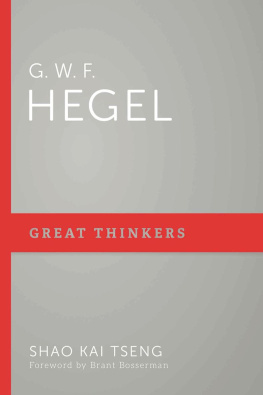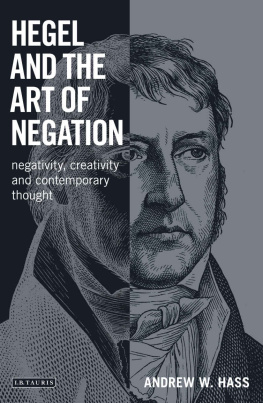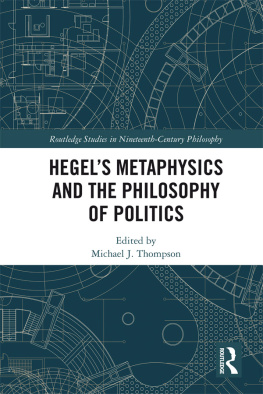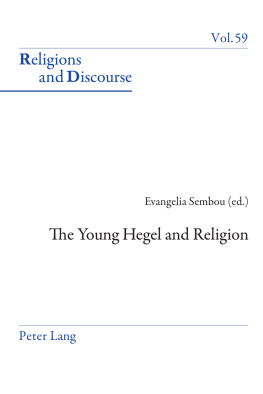Drucilla Cornell - Hegel and Legal Theory
Here you can read online Drucilla Cornell - Hegel and Legal Theory full text of the book (entire story) in english for free. Download pdf and epub, get meaning, cover and reviews about this ebook. year: 1991, publisher: Routledge, genre: Religion. Description of the work, (preface) as well as reviews are available. Best literature library LitArk.com created for fans of good reading and offers a wide selection of genres:
Romance novel
Science fiction
Adventure
Detective
Science
History
Home and family
Prose
Art
Politics
Computer
Non-fiction
Religion
Business
Children
Humor
Choose a favorite category and find really read worthwhile books. Enjoy immersion in the world of imagination, feel the emotions of the characters or learn something new for yourself, make an fascinating discovery.

- Book:Hegel and Legal Theory
- Author:
- Publisher:Routledge
- Genre:
- Year:1991
- Rating:3 / 5
- Favourites:Add to favourites
- Your mark:
- 60
- 1
- 2
- 3
- 4
- 5
Hegel and Legal Theory: summary, description and annotation
We offer to read an annotation, description, summary or preface (depends on what the author of the book "Hegel and Legal Theory" wrote himself). If you haven't found the necessary information about the book — write in the comments, we will try to find it.
Hegel and Legal Theory — read online for free the complete book (whole text) full work
Below is the text of the book, divided by pages. System saving the place of the last page read, allows you to conveniently read the book "Hegel and Legal Theory" online for free, without having to search again every time where you left off. Put a bookmark, and you can go to the page where you finished reading at any time.
Font size:
Interval:
Bookmark:



Edited by
Drucilla
Cornell
Michel
Rosenfeld
David Gray
Carlson

Published in 1991 by
Routledge
An imprint of Routledge, Chapman and Hall, Inc.
270 Madison Ave,
NewYorkNY 10016
Published in Great Britain by
Routledge
2 Park Square, Milton Park,
Abingdon, Oxon, 0X14 4RN
Transferred to Digital Printing 2010
Copyright 1991 by Routledge, Chapman and Hall, Inc. Chapters 2, 3, 4, 9, 10, 11, 12 copyright 1989 in the names of the authors of the essays.
All rights reserved. No part of this book may be reprinted or reproduced or utilized in any form or by any electronic, mechanical or other means, now known or hereafter invented, including photocopying and recording, or in any information storage or retrieval system, without permission in writing from the publishers.
Library of Congress Cataloging-in-Publication Data
Hegel and legal theory / Drucilla Cornell, Michel Rosenfeld, David Carlson, editors.
p. cm.
Proceedings from a conference held in March 1988 and sponsored by the Benjamin N. Cardozo School of Law.
Includes bibliographical references and index.
ISBN 0-415-90162-6 (HB). ISBN 0-415-90163-4 (PB)
1. Hegel, Georg Wilhelm Friedrich, 17701831Congresses. 2. Law PhilosophyCongresses. I. Cornell, Drucilla. II. Rosenfeld, Michel, 1948 . III. Carlson, David (David Gray) IV. Benjamin N.
Cardozo School of Law.
K230.H432H44 1991
| 340'.1dc20 | 90-25928 CIP |
British Library Cataloguing in Publication Data
Hegel & legal theory.
1. Jurisprudence /
I. Cornell, Drucilla II. Rosenfeld, Michel III.
Carlson, David
ISBN 0-415-90162-6
ISBN 0-415-90163-4 pbk
Publisher's Note
The publisher has gone to great lengths to ensure the quality ofthis reprint but points out that some imperfections in the original may be apparent.
Michael Theunissen
Charles Taylor
Robert Bernasconi
Arthur J. Jacobson
Alan Brudner
Peter Benson
Peter G. Stillman
Michel Rosenfeld
Ernest J. Weinrib
David Farrell Krell
Andrew Arato
Fred Dallmayr
Bernhard Schlink
Although sporadic citations to Hegels' Philosophy of Right can be found in legal scholarship, the birth of Hegelian studies within American legal scholarship can be traced to a conference held on March 2729, 1988, at the Benjamin N. Cardozo School of Law, Yeshiva University, New York, N. Y. This conference, entitled Hegel and Legal Theory, inspired the title of this volume. Some of the essays in this volume were presented at that conference, and some others are outgrowths of different papers presented there. The proceedings of this conference are published in volume 10 of the Cardozo Law Review, pp. 8471931 (1989). We gratefully acknowledge the permission of the Cardozo Law Review to reprint portions of some of the papers here.
This extraordinary conference was made possible by a generous gift by Jacob Burns and the Jacob Burns Institute. Through his generosity toward the Hegel project and, since then, several other projects which have explored deconstruction and legal theory, Mr. Burns has assured himself an important role in the recent unfolding of new energy and new/old ideas within American legal studies. It is to him that the editors are honored to dedicate this volume.
The recent surge of interest in Hegel's writings on law among scholars spanning the broad range of disciplines represented in this volume of essaysnamely, law, philosophy, political science and sociologyseems in significant measure linked to a paradox that strikes at the heart of our present relationship to law. That paradox is that ever greater numbers of people are turning (or returning) to the rule of law, at the very same time that frustration and dissatisfaction with law are on a steep increase. On the one hand, as attested by the dramatic changes over the last couple of years in Eastern Europe and by the series of transitions from authoritarian regimes to constitutional democracies in other parts of the globe, there appears to be a sweeping worldwide mobilization in support of the rule of law. On the other hand, in the United States, where respect for the rule of law has been a centerpiece of the national ideology for over two hundred years, there is a serious crisis of confidence concerning the law's objectivity as well as fractious debate and stiffening polarization concerning the proper function and legitimacy of law. In view of these developments, moreover, it is not surprising that Hegel scholars should focus with particular interest on his writings on law or that those troubled by the fragmentation and apparent delegitimation of much contemporary legal discourse should turn to Hegel's systematic approach to law for possible alternatives.
The current importance of Hegel to legal theory is clearly underscored by the concurrent retreat of Marxism and the increasingly evident failure of liberalism cogently to integrate the legitimate needs and concerns of the individual with those of the community. Indeed, there now seems to be irrefutable proof that systematic departures from the rule of law are much more prone to lead to intolerable affronts against human dignity than to any genuine emancipation. Accordingly, Hegel's vision of the legal sphere as necessary to the development of relationships of mutual recognition and respect among autonomous social actors looms as superior to Marx's one-sided grasp of law.
If Marxism has tended to underestimate the worth of the rule of law, liberalism has often erred in the opposite direction. Under some prevalent conceptions of liberalism, the legitimate role of the state is reduced to that of neutral and impartial enforcer of generally applicable legal rules. These rules are primarily concerned with securing the legal enforceability of certain fundamental individual rights in the belief that respect for such rights triggers the operation of some invisible hand mechanism that automatically harmonizes individual interests with the common good.
The various proponents of liberalism may disagree as to which particular rights deserve the greatest legal protection. For example, liberals who believe that a free market economy supplies the desired invisible hand mechanism stress negative freedom over equality rights whereas Neo-Kantian liberals insist that rights to equal concern and respect are paramount. But all proponents of liberalism tend to purge history and politics from the arena of social interaction. Liberalism thus enhances law's importance at the expense of politics and historically grounded collective norms and customs, but in so doing it impoverishes the realm of social relations by reducing it to an arena of formal rights attaching to largely a historical an unduly abstract individual subjects.
In contrast to liberalism, Hegel neither decontextualizes legal relationships nor does he overvalue the role of the rule of law. In his Philosophy of Right
Font size:
Interval:
Bookmark:
Similar books «Hegel and Legal Theory»
Look at similar books to Hegel and Legal Theory. We have selected literature similar in name and meaning in the hope of providing readers with more options to find new, interesting, not yet read works.
Discussion, reviews of the book Hegel and Legal Theory and just readers' own opinions. Leave your comments, write what you think about the work, its meaning or the main characters. Specify what exactly you liked and what you didn't like, and why you think so.

